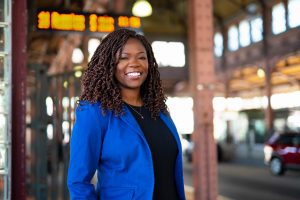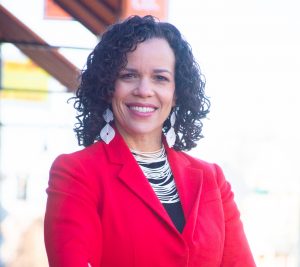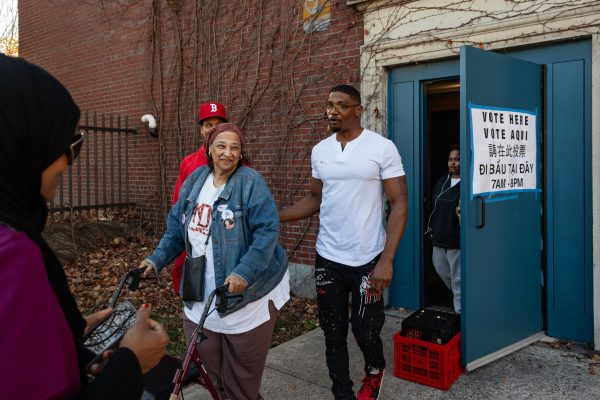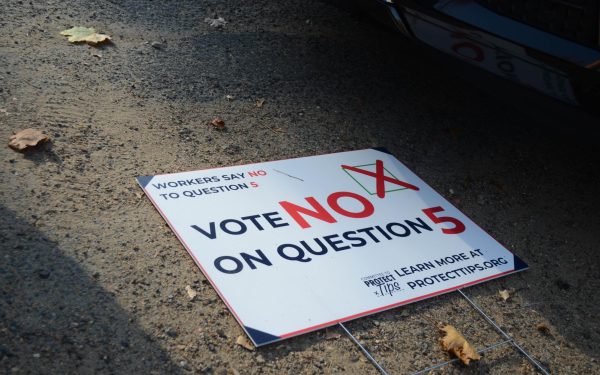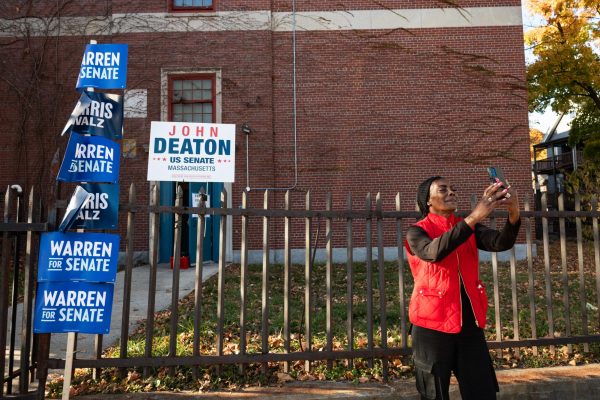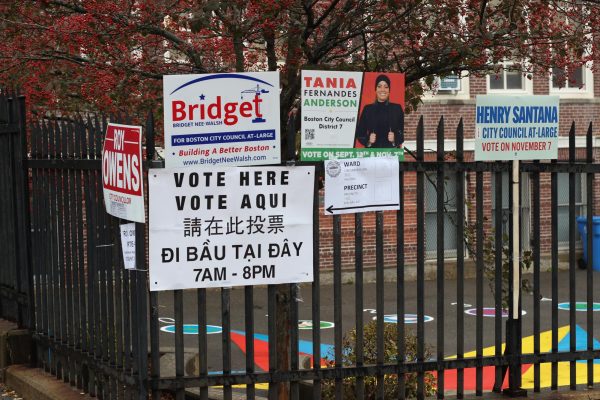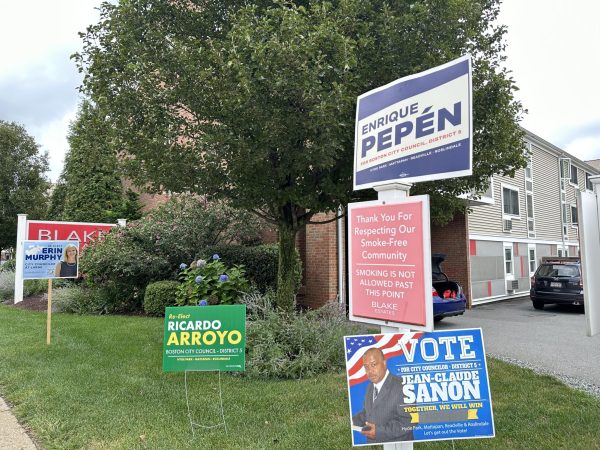City council race: James “Reggie” Colimon running for at-large seat
James “Reggie” Colimon, previously Mayor Walsh’s Liaison to the City Council, is running for one of four at-large seats in the Council.
Colimon is running against at least 17 other candidates, including incumbents Michael Flaherty and Julia Mejia. Incumbent Councilors At-Large Michelle Wu and Annissa Essaibi-George are running for Boston mayor.
An immigrant from Haiti, Colimon touts 16 years of experience working in various Boston city government roles. Under the late Mayor Menino’s administration, Colimon said, he helped establish the city’s first Free Immigration Clinic where people can seek free immigration advice from attorneys.
To fix the many issues in Boston, Colimon said he believes in collaboration. “The same issues that were debated on a soccer field at MIT or in other places in Cambridge in other places around Boston…35 years ago are the same issues that are being debated today, whether it’s racial tension, displacement, lack of better jobs, lack of opportunities, systemic inequities,” he said. “All of which I think can be definitely addressed [if] we all get together as one.”
The Scope spoke with Colimon about his campaign’s top issues and plans to address them if elected City Councilor At-Large. This interview has been edited for length and clarity.
What has your experience been living and working in the city of Boston?

First and foremost, thank you again for the privilege of this interview. I was born in Haiti, and I came to Boston in search of a better life. And I’ve been here for the past 35 years.
When I came to Boston, I was welcomed by a community of immigrants that came from the four corners of the globe, and we had so many things in common, among which are the search for a better life. That was a big thing. We also have to search for better opportunities. But also, there were some heartaches, you know, sharing stories, how can we advance in a new environment, speak the language, speak your culture.
Overnight, I became the de facto interpreter for many of my friends that came wherever they were from China, from Vietnam, from Haiti, from the Dominican Republic, wherever they came from the four corners of the globe. And the fact that they trusted me to be kind of the de facto interpreter, it was not because my English was any better, it was because there was a trust factor that was established between them and me — right on the onset — and also the people they were trying to communicate with also trusted me.
So, fast forward to today, I’ve had the privilege of working for four mayors in two different municipalities. My first position [was] working as a civic leader, I would say. I went to grad school, and I have an MBA in International Business, an MA in International Policy Studies, and a BA in Political Science and Foreign Languages.
But I started my career in banking, just like my father was, a banker. I hated every single second of it. I realized that my gratification came from helping people.
That’s why I left the banking industry and went to work for Mayor Menino, the longest-serving mayor in Boston. And that’s where I met and again reconnected with the people from the four corners of the globe to help them out with the Office of New Bostonians, which is now called the Office of Immigrant Advancement. That’s where I pioneered an Immigration Clinic for people that could come to City Hall to get help on immigration matters.
The reason why that program was created was for the unfortunate incident that happened on 9/11. This program is still in existence today. I have left Boston a couple of times, but I always come back to Boston because Boston is home for me. I feel that I was born in Haiti, and Boston is home. But I feel that I’m a citizen of the world because I’m multilingual, multicultural and my friends are from the four corners of the globe.
What motivated you to run for City Council, particularly for the At-Large seat?
There are many reasons. The same issues that were debated on a soccer field at MIT or in other places in Cambridge in other places around Boston and in the surrounding area 35 years ago are the same issues that are being debated today, whether it’s racial tension, displacement, lack of better jobs, lack of opportunities, systemic inequities, all of which I think can be definitely addressed [if] we all get together as one.
Too many kids are graduating high school right now without proper reading comprehension. They can’t read properly. Some excel but not a lot of them. Too many kids are graduating right now; they cannot balance a checkbook. That is if they have a checkbook.
So financial literacy should be part of all the curriculum in schools in Boston. Many people are trying to buy their first home until they realize that they have bad credit or do not have sufficient credit. So we need to teach people financial literacy so they can be equipped to know their goals, and then they know that they should be able to be ready to do that purchase.
I’m running for this position because, after working for 40 years, sometimes you have your ideas, sometimes they get shoved away. When you’re the elected official, you can push for [those ideas]. The past 18 months taught me a lot. I’ve always been kind of behind the scenes, but when you’re looking at our age-strong community that has experienced a pandemic within a pandemic. Same thing with the youth [who experience] isolation because you’re closed up in a room in your house, and you can’t see your loved ones.
All you have is the virtual world, so you need reliable Internet access. Twenty percent of households in the United States do not have Internet access. And when it comes to the low-income neighborhoods, you can double that. That’s only one of the aspects; you also need to have the tools, the computers, the laptop, whatever you need, the reliability of the access and the knowledge of how to use [these technologies].
If and when I get elected, I’ll definitely collaborate with some of the organizations here in Boston. One is Tech Goes Home, to see how we can partner to make sure that everyone is on the same equal footing. Boston is a city of many firsts, and Internet access should be something that we should have that should be reliable.
You just mentioned a range of issues that you’re planning to address when in office, but what would you say are the key issues or priorities?
It has to start from the bottom up. Universal Pre-K for all, free Pre-K and makes sure that we include childcare for working parents. And then [in terms of] high school, we have a vocational training program here in Boston, but when I was doing some research and looking at the best 25 programs in the nation, none of them are in Boston.
I went further than that best 50, none of them is Boston. There’s only one program in Boston, which is Madison Park, which I feel needs to be re-energized. With so much money coming down from the [Federal Government] with the infrastructure bill, we need to be able to find some of the money to regenerate schools.
Furthermore, vocational training programs should not only be at one school. We have a lot of people that are not high school age, younger adults, or those trying to re-enter the workforce that for some reason lost their jobs last year due to the pandemic or due to something else. We have to partner with the two community colleges here in Boston, Roxbury Community College and Bunker Hill Community College, [we can have] some kind of vocational programs there. I feel that these are very meaningful [programs] and will be very beneficial for all of us.
Furthermore, we have a life fund program for Black and brown kids to go to law school. The way I would want to do this is by exposing them to high paid internships with the DA’s office…I’ll partner with all the major law firms in Boston to take a few kids into summer, not for them to [do] copies, but to go to court, to do research for you, so they…can be exposed to the role.
These are the things that I want to do to make sure that they learn more, and then they get to say, ‘Okay, yeah, well I can do this.” But you cannot be something you’re not exposed to unless you come from a…generation of lawyers or doctors or engineers.
[Going back to] vocational training again, a lot of kids are graduating high school right now; they do not want to go to college. And that’s because some of them are brilliant, they can have their own businesses, so we have to have some entrepreneurship programs as part of [vocational training] to help them.
When you graduate with a vocation…you get a high paying job with your union or what have you…There’s a need for a carpenter, plumber, electrician, and there is a need for even a cosmetologist. There is a need for all things.
However, for those that do want to go to college, I want to make sure that they get the right counsel that does not get them into debt for no reason. You know, hundreds of thousands of dollars of debt, and then getting jobs that pay them $40,000 to $50,000. It doesn’t make any sense. As an immigrant, my parents would have killed me if I didn’t go to college, but I know better now. I’m glad I went. Again, if you want to, that’s fine. But if you do not want to go, I don’t want you to graduate high school…scratching your head asking, ‘Okay, what’s next?’
What’s happening is the trades are being devalued in this country. We need to value the trade just like everything else. You should [get] the same respect whether you’re a carpenter or a doctor.
How do you plan to implement these policies in the City Council if elected?
First of all, if you look at everything that’s [on my platform], I don’t have a utopian platform. These are attainable things regardless of whether you’re on the left, in the middle, or on the right. My platform is very different, purposefully because I’m taking the subjects that are very important to all of us that would make sure that — as I mentioned earlier — your neighbor prosper, you prosper.
So I would find it very difficult for someone in the Council not to agree with what I’m trying to do. Because if they were not to do what I’m [proposing], I don’t think it would go well with their constituents.
I’d like to work in collaboration with every single one of them, that’s what I’ve been doing all my life, that’s the reason why I’m running for the at-large [seat] — that’s one of the questions you asked earlier —that’s just because I know people from the four corners of the globe.
I am multilingual. With the Latino community, I speak Spanish fluently. Portuguese, I get by. Italian, I get by. French, Haitian Creole, and English. I have friends from…all kinds of backgrounds you can think of. No other candidates can say that they are ready to hit the ground running on day one like I am because I’ve worked as Secretary Walsh [and] then Mayor Walsh’s Liaison to the Council.
People don’t understand that the Council and the Mayor’s [office] are different things. When you add the experiences on both of them, it’s very, very important. I’m not going to waste time learning on the job; I know the job. And I’ve made the collaboration, and I have all the elected officials’ numbers on speed dial, and they have mine as well. And some of them are supporting me. So I feel that it should be easy for me to work on these issues if and when I get elected.
Since you mentioned your experience working in the city government, can you talk a bit about the different roles and what you could achieve in those roles?
First, I’ve had three roles combined for about 16 years for the city of Boston. My first role was in Public Relations and Labor Relations for the Office of New Bostonians, which is now called the Office of Immigrant Advancement. And I’m proud to say that while I was there, we did some innovative programs, such as pioneering the Immigrant Clinic, which is still in existence today.
We had an event that was called “We are Boston.” It was an event where people from the four corners of the globe would gather. First thing, we had New Bostonians Community Day… at City Hall, where the constituents of Boston would come and learn about city departments, you know, how to get a permit if you’re doing some work at home if you want to start a business, how do you start that, so on and so forth.
Then we changed that into the We Are Boston gala event, a fundraiser to fundraise money for English for New Bostonians, which is now a separate entity. And we used to fund 20 to 30 programs per year. Hotels will have their programs; the unions will have their programs for people in the service industry to learn how to speak English. So that’s for the Office of New Bostonian, which is now the Office of Immigrant Advancement.
Fast forward to when I worked for Mayor Walsh… I left Boston, went to Orlando and worked for the mayor of Orlando. But while I was in Orlando, Secretary Walsh became the Mayor of Boston, and he asked me to come to be the Liaison to the Council. That’s where I learned everything about the Council and…[the Mayor’s office]. And I held that position for three-plus years.
And then, one of the things we realize in the city of Boston, we host a lot of delegations from all over the world. Still, there was not a centralized place to [keep track of] who’s meeting with who, and we started the Office of Global Affairs, which is within the Economic Development Cabinet, and it was me and a colleague that handled all that.
You see, Boston has 11 sister cities, for instance, when it comes to international partnerships, so I handle all that, receiving the requests. Let’s say that a Prime Minister from XYZ countries is coming to give a lecture at Harvard or MIT, either one of the schools they always call Boston. So those requests would come to me, then I would vet them and say, ‘Okay, mayor, I think you should meet with that person.’
So these are the things that I’ve done to make sure that the city of Boston stays relevant in the global world. But I’d like to take this opportunity to say that…the international partnerships do not truly reflect the city of Boston when it comes to the demographics because, you know, 20% of the population was born somewhere else, which is one out of every four Bostonians. Right now, we do not have any partnerships in Latin America, South America or the Caribbean. That’s one of the first things I’ll do when I get in as an elected official.
What is something that you think is working in the city of Boston, what’s something that can be changed, and how would you go about making that change?
Despite everything, we collaborate. We are leaders on many fronts. A lot of people are advocating for free transportation, but I’m advocating for reliable transportation as the most important thing.
I think what’s not working [is that] sometimes we have to be a little bit more humble. That’s because we [have] like I said, the first subway in 1901, I think… but it hasn’t changed since then. And as an old city, it’s kind of hard to rearrange the infrastructure and so on and so forth. But we also have to learn from others.
The things that should be changed, I think, when it comes to development, prioritizing transit-oriented development, with the goals of making Boston a 15-minute city so that goods and services will be well within reach of everyone by adjusting the zoning rules to allow smaller-scale multi-family housing.
Some people get mad at me when I say that we need more police officers. And I’d like to take this opportunity to clarify what I said before. A lot of people are really retiring from the police force, but not as many are coming back in. So the police department needs to be adequately staffed. However, we need to make sure that whether it’s you, whether it’s me, to enter the force, we should take a sensitivity training test, a certificate before we even take the test to know if it’s what you really want to.
Because I want the police force to be where the community that is served [is]…Community police are something that we need to support. How wonderful it is, you’re having an event, and you see an ice cream truck coming to give free ice cream to neighbors and families and police officers or the cadets are serving them. So these are the things that we need to continue to work on: to make sure that we have more dialogues, and we need to know our neighbors more. And going back to the basics, we have to go back to the basics for a city to work properly.
Is there anything else that you want to share that I didn’t ask you?
[I want to talk about] supporting the [mask] mandate recently. A lot of [people] are talking about the difference between how now we have a Delta variant that is making all of us really worried about how we should address this.
Some people are afraid of saying that [they] support mandating people to take the vaccine or [prove] they are. For religious reasons or past historical reasons, some people may not want to take the vaccine. However, if you want to go to a restaurant and I took the vaccine, you didn’t want to [take the vaccine], that’s up to you. So I feel that you know we should protect ourselves. Indoor seating should have some kind of requirements for the vaccine — and everything is being developed now to a QR code.
If you hate wearing your mask, you should get vaccinated. I signed up for the vaccine the minute they became available. We have to listen to the experts. The more people that get vaccinated, the fewer [people] will needlessly die. I felt bad when my parents went into isolation. I couldn’t even see them, seeing your parents from a window is really awful. And I think that if we listen to the experts, listen to the science I think something that will [benefit] all of us.
And lastly, I thank you so much for being so accommodating and for allowing me the privilege to share my platform and my vision with the city on how we can have a better Boston for all of us. As I mentioned earlier, I am the only candidate that can hit the ground running on day one because I work in two different municipalities for four mayors — I worked for Mayor Janey, who is currently running for mayor. I have the passion, compassion, and vision to promote, lay down the foundation for a better Boston for you, for me and for everyone else.
I want to make sure that the people of Boston understand that we can have a better Boston for all of us. Your neighbor prospers; you prosper. Lastly, your income should not dictate your outcome. I strongly believe that your zip code should not say what your social status is in the city but about the rich history and culture in that neighborhood.


